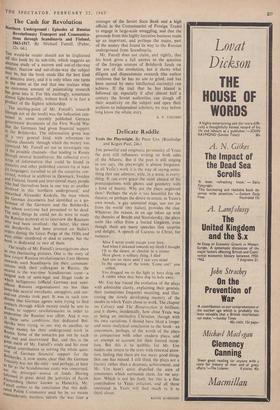The Cash for Revolution
Northern Underground : Episodes of Russian Revolutionary Transport and Communica- tions through Scandinavia and Finland, 1863-1917. By Michael Futrell. (Faber, 32s. 6d.) TRE would-be reader should not be frightened off this book by its sub-title, which suggests an abstruse study of a narrow and out-of-the-way subject. Narrow and out-of-the-way the subject May be, but the book reads like the best kind of detective story, and it is only when one turns to the notes at the end that one realises what an enormous amount of painstaking research has gone into it. For this excitingly, sometimes almost light-heartedly, written book is in fact a Product of the highest scholarship.
The starting-point of Mr. Futrell's research (though not of the book) was the indication con- tained in some recently published German government documents of the First World War that the Germans had given financial support to the Bolsheviks. The information given was of a very general kind, with references to `various channels' through which the money was conveyed. Mr. Futrell set out to investigate one of the possible channels—that leading to Russia through neutral Scandinavia. He collected every scrap of information that could be found in Memoirs and other published sources (in at least six languages), travelled to all the countries con- cerned, worked in archives in Denmark, Sweden and Finland, found and interviewed many people who had themselves been in one way or another Involved in this 'northern underground,' and unearthed Alexander Keskula, the man whom the German documents had identified as a go- between of the Germans and the Bolsheviks, but whom everyone had presumed to be dead. The only things he could not do were to study the Russian archives or to interview the Russians who had been involved : the latter, like most old Bolsheviks, had been arrested on Stalin's orders during the Great Purge of the 1930s and were either murdered or died in camps, but the book is dedicated to two of them.
The results of Mr. Futrell's investigations show us two fascinating pictures. One is the story of how emigre Russian revolutionaries from l-lerzen °owards used Scandinavia for their communi- cations with their colleagues in Russia; the second is the war-time Scandinavian scene--a tangled web of semi-legal and illegal trade in Which belligerents (official German and semi- neial Russian organisations) no less than uona-fide neutral merchants, smugglers, and out- a,11. d-out crooks took part. It was in such con- onions that German agents were trying to find contacts through which money could he sent 4) Russia to support revolutionaries in order to undermine the Russian war effort. And it was In these same conditions that dedicated Bol- sheviks were trying, in one way or another, to obtain money for their underground work in Russia. Some of the tentacles put out by each slue met and intertwined But, and this is the great merit of Mr. Futrell's study and his most original contribution to solving the whole ques- i!" of German financial support for the ,uolsheviks, it now seems. clear that the German treasury Was not the only—and perhaps. at least as far as the Scandinavian route was concerned. ,Mr the principal—source of funds. Having 2.31lowed u great detail the activities of Jacob Iltirstenberg (better known as Hanecki), Mr. Futrell comes to the conclusion that this dedi.. Fated Polish Communist used his by no means Inconsiderable business talents (he was later a manager of the Soviet State Bank and a high official in the Commissariat of Foreign Trade) to engage in large-scale smuggling, and that the proceeds from this highly lucrative business made up an important, and perhaps the major, part of the money that found its way to the Russian underground from Scandinavia. Mr. Futrell does not claim, and rightly, that his book gives a full answer to the question of the foreign sources of Bolshevik funds on the eve of the revolution, but it shows what diligent and dispassionate research (the author confesses that he has no axe to grind, and has been moved by mere intellectual curiosity) can achieve. If the trail that he has blazed is followed up, especially if after almost half a century the Soviet authorities can slough off their sensitivity on the subject and open their archives to independent scholars, we may before long know the whole story.
S. V. UTECHIN


































 Previous page
Previous page